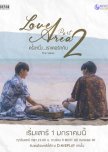
This review may contain spoilers
BL that manages to be more than BL in some ways
In a nutshell:The story is interesting though some may bemoan the way the series doesn’t seem to have a major conflict or point of tension for quite a few episodes. However, the series never feels slow or boring to me. There is a lot to love about this series because it doesn’t always tell the story in an in-your-face manner. But this could well be its weakness too. For example, if it had emphasized how one of the main characters’ (Pharm) incomplete recollection of his previous life early could pose a problem to their relationship, the tension and suspense built could have maintained the interest of more viewers.
In a coconut shell:
The series starts with the tragic double suicide of Korn/In, certainly not the lighthearted schoolboys-fall-in-love stuff that is so common in BL (though the characters are students). The double suicide is the result of parental objections to their relationship because of their sexual orientation, a rather serious consequence compared to popular BL series that treat the topic of objecting parents less seriously (e.g. Together with Me: The Next Chapter in which the parents change their minds, and Dark Blue Kiss in which the parents are surprisingly open-minded). The seriousness in tone, though not all that persistent, makes it different from a lot of BL that focus on the couples’ relationship without such a strong regard for the society in which the story is set). Where the Dean/Pharm story is concerned, the use of common BL tropes (like a “straight” guy falling in love with another guy) is rather sparing. This may be a good thing, but the side couple (WinTeam) may appeal to BL fans more and may be more conventionally BL.
In the parts of the story that use common BL tropes, the series does become more like BL and somewhat less realistic. The inclusion of a BL fangirl of sorts (Manaow) and the way Dean’s swimming team do not seem to bat an eyelid when their captain brings his boyfriend with him on a team outing are where BL fans find themselves in familiar terrain, though we can guess how often that happens in real life in Thailand. Interestingly, these elements seem to be used to contrast past and present, making a point about how increased openness towards homosexuality in society makes a huge difference for same-sex couples and even the two fathers who live in regret after their sons’ deaths. The society in the Dean/Pharm parts of the story feels much less oppressive that the atmosphere in the Korn/In story. We can see this from the minor characters’ behaviours: whereas Pharm’s friends accept and encourage his relationship with Dean, In’s good friend only quietly feels happy for him when he sees In together with Korn. Such subtle touches make the story rather interesting and worth re-watching.
There doesn’t seem to be a rush to bring the plot to new heights of tension. There is neither an excessive preoccupation with kissing and sex scenes nor an aversion to them. Although a number of viewers seem to find UWMA to be rather slow-moving or that it’s not clear where the story is going, I have a different opinion. In fact, the story is fairly well-paced, with the flashbacks seldom being unnatural as they show the parallels between the previous lives and the present lives. I suppose one thing that frustrates some viewers is the way the Dean/Pharm storyline doesn’t seem to have any obvious conflict for a large part of the series, which may give the impression that it is going nowhere. However, I like the way events are foreshadowed and how the characters slowly recall and come to terms with their past lives. As I watched each episode on a YouTube playlist, I get to the last part before I know it (it’s quite a different experience when it comes to series like I Am Your King Season 2).
Another aspect of the series that I like is how Dean and Pharm have different personalities from their past lives. The differences are more subtle in Dean, who seems calmer but also more determined to make his relationship work out than Korn. As for Pharm, while he’s clearly attracted to and in love with Dean, he does not rush into the relationship. As a really good cook, Pharm is set apart from In who cannot cook to save his life. This difference isn’t merely superficial for the patience and skill with which he cooks indicates a different personality. Both Dean and Pharm seem to have “learnt” something from their previous lives. The dynamics of their relationship are somewhat different too. While we see more passion between Korn and In, we see more tenderness between Dean and Pharm. The interplay between the parallels and differences indirectly creates suspense: will the couple finally have a happy ending, or will history repeat itself? Most of the time, the story seems geared towards a happy ending but there is foreshadowing of a problem to come, especially in a scene where a monk reminds the couple of the importance of forgiveness. In the end, we see that Dean/Pharm must reconcile with the people in their past lives and settle their unfinished business before moving on as themselves in their present lives. It seems paradoxical in the end, but it makes sense: Dean and Pharm have acquired new identities and cannot be living in the shadows of Korn and In forever, so while accepting that they are reincarnations of Korn and In, they must still be able detach themselves from their past lives. (An interesting scene in the last episode with Dean and Pharm dreaming of Korn and In as third parties and not as themselves for once shows that they have finally managed to move on as Dean and Pharm, not reincarnations of Korn and In.)
I also love WinTeam in this series although it often looks like the WinTeam scenes are a teaser/test for a possible Season 2 which will focus on them. I would love to watch a Season 2 with WinTeam as the focus though even with the same production team, I believe a Season 2 with WinTeam will be enjoyable in a rather different way. If this series doesn’t appeal to you, you could still give Season 2 a chance if it is made.
Edit: After considering why I've been feeling that something is a little lacking in this series despite my love for it, I realize that there isn't that much on how the characters fall in love. For Dean and Pharm, each immediately feels like the other is the one on first sight because of their past lives, so we can only look to Korn and In. But while we can see the depth of Korn and In's love, we don't see enough of what makes their love so strong. Our involvement in their story would be stronger if there had been a bit more showing Korn and In's love for each other.
Was this review helpful to you?

This review may contain spoilers
Inconsistent quality: likable in some ways but sometimes frustrating
This BL has loads of potential and is surprisingly good for quite a number of episodes for such a low-key BL (compared with say, Love by Chance 2, which is airing around the same time). In fact, I stumbled upon it by chance because it doesn't seem to have been listed in lists of Thai BLs.The main couple starts off being the sort I personally love to see, with them caring for each other in little ways even when they do not make their love for each other obvious. The story of Tan and Oil is interesting at the start with Tan being an archetypal "bully who turns out to be a softie" sort of character who becomes a much more nuanced character especially after the demise of his mother. (It may come as a pleasant surprise that Tan's affection for Oil is more obvious to us from quite early on when he almost kisses a drunk Oil but stops himself.)
Unfortunately, the development of their relationship seems to be headed nowhere during the middle of the series despite their attraction to each other. Despite being obviously in love with Tan, Oil inexplicably seems willing to date/consider dating Kun. Yes, he has the right to date others since Tan and him aren't dating and Tan hasn't made his feelings clear. To make matters worse, Oil's affection for both Tan and Kun seems genuine--at one point he appears genuinely happy when Kun confesses his love, and yet he also seems to be considering Kun because he thinks Tan only treats him as a brother.
Towards the end of the series, the plot becomes haphazard, compromising what could have been a reasonably good series. The scriptwriter(s) decides to throw in an incident in which Oil feigns illness, causing Tan to misunderstand him when Tan finds out. Although it is clearly suggested that Oil is under some pressure to feign illness (this isn't clarified even by the end of the series), the already baffled audience doesn't need to be baffled further at this point. The characterization of Tan is also problematic. At one point, he seems willing to let Oil be with Kun, indicating that he will do anything for Oil to be happy. However, he also gets jealous and upset after he realizes that Oil has got into Kun's car while pretending to be ill. (Tan thinks that they have gone out on a date or something.) Such behaviors can perhaps be convincingly portrayed if the actors had the ability to convey the nuanced emotions, but this was a bit too challenging for such young actors.
Apart from the unnecessary events that are added in for no particular reason, characters are added in and cast aside simply to complicate matters. Tan's stepbrother, for example, does not seem to have any particular motivation for his unpleasant behavior and seems to have been added in because the scriptwriters want some tension. Then there's Kun, the poor guy who seems to really like Oil. Oil agrees to go out with him and even agrees to be his boyfriend in the last episode. But just seconds later, Tan appears, takes Oil away, confesses his love to him and they live happily ever after. Nothing is shown about Kun after this, which also possibly and unintentionally also turns Oil into arguably the most selfish bastard in the whole story.
Tin and Sea, as of Episode 8, seems to be the other main couple (potential couple) though this is where things get somewhat confusing. Firstly, apart from the fact that Sea is Tan's friend (we only see them talking to each other over the phone though), Tan and Oil seem to exist in an entirely different social circle from Tin and Sea, and there is practically no connection in the Tan/Oil and Tin/Sea stories. Secondly, it is not entirely clear whether if Tin is in love with Sea even after two-thirds of the series is over. Sea is supposedly straight and in love with his female childhood friend, but we know that this doesn't matter in the world of BL. What is bewildering is Tin seems to have fallen in love with Sea at first sight though later it is revealed that Tin supposedly has a girlfriend. The girlfriend is overseas and only mentioned by the characters, and Tin only ever seems to think of her when he needs an excuse to spend time with Sea.
The confusion regarding Tin/Sea could be something that we can bear with easily if not for the extra confusion arising from the messy friendship/relationship amongst the other characters in Tin/Sea's circle. There is It (a confusing name because I often find myself wondering "What is it?" until I realize that "It" is a name) who seems to have been punished because some other guy (presumably Voice) wrote a note to him saying that he loves him (It)--is that even his fault even if we don't quibble about whether a guy being in love with another guy is wrong? It's love-hate relationship with the music club is also bewildering--he was kicked out of the club (or suspended?) because of the aforementioned declaration of love, but it's not as though everyone in the club has done something against him. I suspect that part of the confusion arises from flaws with the subtitles.
The pacing is fine but uneven. The switches from the Tan/Oil story to the Tin/Sea story makes it feel like I'm watching two different series without being able to finish one before watching the other. As of Episode 8, the series still gives the impression that it can be salvaged. Unfortunately, by Episode 11, one gets the sense that the ending (Episode 12) is going to be very rushed if the series is even going to have something that resembles a proper ending. Episode 11 focuses solely on Tan and Oil, so we are left in the middle of nowhere when it comes to Tin and Sea, after seeing the cute scene of Tin trying to do something to cheer Sea up.)
With a title like "Friend Forever" (or "Friends Forever depending on the translation), one may wonder if there is going to be an awful ending in which everyone just remains friends. Thankfully it doesn't have such an ending. However, the happy ending for multiple couples just happen out of nowhere, which makes the ending really abrupt and bizarre. It's like a student submitting an exam essay that suddenly skips to the conclusion because he has made too many irrelevant digressions to elaborate on his main points within the time limit.
The series goes downhill about halfway through, particularly in the last 4 episodes. It is a waste of actors and characters who show promise at the start. Though the unnecessary ambiguity and complexity of emotions prove to be too challenging for him, Leo (who acts as Tan) has been able to carry off his role well for most of the episodes, successfully showing the propensity for the character to appear more cold than he really is, his innocence and hidden insecurities well. Tai, who plays Oil also pretty much conveys the character's slight girlishness and playful streak quite well. Heart and Bank may have less interesting roles as Tin and Sea, but they are really good looking actors whom audiences won't mind seeing. I have never seen someone looking as adorable as Tin while trying to suppress a smile (Episode 6), lol.
This is actually a fairly promising series that would probably have benefitted from a bigger budget and a more experienced team. I remember reading somewhere that it is directed by the same director who directed Love Sick, its sequel and its spinoff, Thank God It's Friday. Perhaps the team really needs a series with as many episodes as Love Sick 2 to do more justice to the material. Friend(s) Forever is better than the rather insipid Thank God It's Friday (though the latter is somewhat more focused and coherent).
Was this review helpful to you?

This review may contain spoilers
Is this a series made to cure BL addiction?
It is already common enough for BLs to suffer from the problem of character overload, but at least sometimes the part for the main couple is done well or there is enough cuteness and sweetness in the side couples to make us overlook the flaws. In Love Area Part 2, however, the part for the main couple (actually the other parts as well) is botched up so badly that it has got to be the work of some evil genius. It definitely takes talent to be able to screw things up this badly with the material started in Part 1.I recall Part 1 being quite bearable despite its flaws like random digressions to side stories that lack development. But at least we see in Part 1 the conflict between Valen and Kaitoon at the start and how their relationship changes over time, and the promise of a romance between them at the end. Part 1 seems to be going somewhere. I was hoping that Part 2 would avoid the flaws of Part 1. However, the flaws are accumulated and magnified instead.
In Part 2, there are even more barely related characters; love triangles become squares or some other polygon. The worst part of the story is the "development" of the relationship between Valen and Kaitoon. They become a couple and enjoy some sweet moments, but there really isn't much of a story to speak of here. Perhaps to add spice to the thing that isn't much of a story, the evil genius lurking around decided that the love triangle with Valen, Kaitoon and Non (someone with a crush on Kaitoon) should be turned into some bizarre love polygon. So while Valen is in love with Kaitoon and getting jealous of Non for childish reasons, he inexplicably also gives some girl flowers, behaving like a shy teen with a crush. (Huh?)
But of course that is not enough "conflict" for the evil genius hiding in the production team. There must be a misunderstanding between Valen and Kaitoon that leads to a break-up before the series ends, right? This is predictable fare except that the evil genius makes Valen's behavior totally illogical. Valen sees Kaitoon's group mate (Sean) being a third party in King and Pete's relationship (King is Valen's friend) and somehow assumes that Kaitoon is in cahoots with his group mate to give Pete a chance to cheat on King. (HUH?)
Speaking of King and Pete, Pete's behavior is about as absurd as it can possibly get. First, his jealousy when he sees King with another guy is practically at psychopathic levels, suggesting an unhealthy obsessiveness. Next, his claim that he has suddenly disappeared and left King suddenly (Part 1) because of his struggles with depression is exposed to be bogus. Even by the end of the series, the reason he has simply disappeared is unknown, just like his reasons for suddenly wanting to make up with King again. Yes, he has been in a relationship with another guy during the disappearance, but is this other guy the reason for his disappearance? Couldn't he have simply broken up with King if he had fallen in love with someone else? And if he is such a jerk, why does he seem genuinely sorry for what he has done?
And, trust me, there is more in all the main characters' behaviors in Episode 7 that will leave you stupefied--if you don't fall asleep watching scenes that look like some advertisement for a tour or the work of a travel vlogger. (They are actually visually appealing but not exactly interesting.) I don't have the ability to describe the mess without using a few hundred words more, and I'm just too lazy to do it.
There is also the addition of at least two more love triangles just so that the scenes can jump purposelessly from one love polygon to another and alienate viewers. The introduction of June, Bill and Sonya into the series appears to be devoid of purpose. (And also: more illogical behavior thrown in.) Then there is also a (straight) love triangle involving Valen's sister that gets added in without development or resolution because -- why not? We are trying to make the series as bad as possible, right? And maybe there can even be a Part 3, right?
By Episode 7, it is clear that even if Episode 8 (the final episode) salvages things a little, it cannot make up for the experience of watching Episodes 1 - 7, which is by turns boring and infuriating. Indeed, Episode provides a bit of a closure. I bet the evil genius behind the mess was disappointed that he could not continue having fun. Do Valen and Kaitoon make up? I would love to give a spoiler, but I can't really tell. It is not because we have an open ending. It's just that I can't be sure if the "ending" is just another daydreaming/imagination scene (like Kaitoon and Non's at the end of Episode 7).
It's sad that Part 2 destroys: (i) the King/Pete pairing when there is potential for a much more moving story for them, and (ii) the character development of Valen in Part 1. It's also saddening that things don't end well for Non, who is a likable person and possibly the only sensibly portrayed character of any importance. Maybe Love Area is secretly The Tragedy of Non. While heartbroken King has friends who care (and even a possible new love interest) and June has someone to cry to, our poor Non does not even seem to have a friend around to console him.
Was this review helpful to you?

This review may contain spoilers
Deserves the praises it's getting
When I first read about the story, I wasn't expecting this series to be amazing though I thought it could at least be decent. It remains that the story isn't exactly the sort that blows one's mind with twists or unexpected plotlines, but this turns out to be a good thing. It is a relatively simple story that is turned into a series that is made very well in practically every way.In the story, Tian, who suffers from a heart disease, gets a heart transplant. He finds out that the donor is a volunteer teacher in a remote village, and he decides to volunteer for the same job. But this is BL, so you can obviously expect a romance here. At first, I was wondering if Tian would just fall in love with his donor's boyfriend and turn into some kind of replacement for her. But this is certainly not the case. The heart donor is in love with Tian's love interest when she's still alive, but her feelings are actually not reciprocated.
The story doesn't go out of its way to pander to BL fans. Again, this can be a good thing. The other characters are given a chance to be portrayed with nuance, which makes the story of the main characters better. Whether it is the villain who has an understatedly menacing aura or the kindly village chief who is surprisingly wise, the characterization enhances the story. I haven't read the original novel, but I dare say this is a wonderful adaptation because it is so easy to spoil things even with a solid original story that is followed faithfully.
Mix, who plays Tian, has a rather challenging role. Apart from the complicated emotions the character undergoes, Mix has to portray the change in Tian after his heart transplant. But it's not a 180-degree change (and there are subtle developments after the heart transplant too), so it's harder than playing two different characters. Mix manages to play Tian before and after the transplant impressively well. It's not often that we have a new actor who manages to portray the character's emotions without any lines, as Mix does in the last episode when he looks around the hut wistfully and starts tearing up.
Earth plays Phupha, Tian's love interest well enough too, though I'm not sure if I entirely understand the character. Phupha's liking for Tian is quite obvious and he even progresses to blatant flirting with Tian. Yet, it is later revealed that he knows Tian's identity (Tian's father is an influential man) from the start, and he later behaves as though Tian should leave the village and forget about him because Tian has a better life to lead. (Oh, then what's up with all the flirting in the first place?) But perhaps this is love--maybe when he falls more deeply in love with Tian, he wants the best for Tian, even if it means he has to lose Tian?
Perhaps one weakness of 1000 Stars is that it's so good that it belongs to a class of its own and loses some of the trademark fluff of the BL genre. There is, for instance, side BL couple at all. And while most BL focus on the BL romance at the expense of everything else in the story, 1000 Stars doesn't sacrifice the other elements of the story. (An example is when Tian is about the leave the village in the last episode. We can see that he is genuinely emotional about leaving the village and the children he has taught, and it's not just about Phupha's absence or his yet-to-be-fulfilled romance. ) One other series that I think is like that is Until We Meet Again, but it seems that praise for 1000 Stars approaches unanimity more closely.
Ultimately, 1000 Stars is a BL series that BL fans can appreciate for its strengths, but it is also a really good series to watch even if you aren't into BL (well, as long as you have nothing against male-male romance).
Was this review helpful to you?

This review may contain spoilers
Exceeds (my) expectations at least
Strengths: The development of Solo and Guitar's relationship is nice as they each face different challenges in life; the cinematography and music complement the story well. The story of Kao and Phu is also cute.Weaknesses: The series could have done with less fluff at the start and given more time for resolution in the last part; the addition of a practically redundant set of characters (Khim, Khem, Perth and Petch) that challenges even the editors who have done a rather good job with the editing overall.
Overall: I like this quite a lot though it has several weaknesses.
I have not read or heard of the novel prior to watching the first episode, but my expectation after watching the first episode was that it would be a sweet and lighthearted BL, full of fluff but still cute enough to satisfy a BL fan. For a few episodes, this seems to be where the series is headed. However, the story of Solo and Gui also takes a more serious turn later, which is both a good and a bad thing.
One problem is that the earlier episodes with more fluff could have been condensed and the story with the slightly more serious turn from the point Gui's foster mother falls sick and passes away could have been given more space for development. A BL with a simpler story would simply end with Solo and Gui becoming officially together after some episodes of childish jealousy on Solo's part. However, it is interesting how Solo and Gui stand by each other through more difficult moments in life and how their relationship is strengthened as a result. The story does turn out to be rather moving without causing one to cru.
The way the relationship develops is a pleasant surprise. However, while I appreciate the way the story moves on the the problems experienced by the couple, the final episode leaves me feeling ambiguous. Perhaps Solo is really being unrealistic in thinking that he can run away with Gui (given that his sole source of money is his father), but I also admire his determined rebellion against his father (which Gui chides him for). In fact, Gui's willingness to make a bet of sorts with Solo's father and arranged fiancee to leave Solo isn't that great a thing either--why should he willingly break up with Solo if he fails his internship?
Of course, it turns out that Solo's father isn't as cold as he appears to be (an overly convenient means of resolving the crisis quickly in the last episode). Neither does he really disapprove of Gui. But it remains that he can and will break up Solo and Gui if he really wants to. The same father has someone stalk his son and report to him everything the son does. Yet, Solo's father is supposed to really love his son. This vision of familial love offered seems to me rather disturbing.
The execution of the final part of the series regarding Solo's father and Gui's internship can possibly have more finesse. Although the series has more than just hinted at the problem that Solo's father would present, his return to Thailand seems timed to suit the structure of the story than anything else. In short, the problem isn't so much a weak story but weak storytelling skills. By the end of Episode 11, we can anticipate how the crisis involving Solo's father is going to be quite suddenly resolved in the final episode. To be fair, it didn't feel all that rushed when I was watching it. Nevertheless, everything just gets resolved too conveniently--instead of solving a problem, it turns out that the problem has never been much of a problem to begin with.
Where storytelling is concerned, the story of the second couple, Kao and Phu seems better, but the story may seem a little hackneyed at first, with Kao being the persistent guy who goes after and melts a seemingly cold Phu. Nevertheless, there is much to love about Kao--he may be persistent and borderline stalkerish, but he doesn't really go overboard. The actor has brought the character to life, especially with a nice scene in Episode 11 where Kao sees Phu before the latter leaves for England: beneath the bunny make-up, we can see that his smile isn't fake or false but a sincere attempt to look happy while saying goodbye, and it isn't exaggerated when he is unable to sustain the smile and starts crying.
Perhaps the biggest weakness of the series is the inclusion of the siblings Khim and Khem and their relationships with the doctors Petch and Perth. While their part of the plot isn't bad as a story, which are better intertwined. Khim is the only tenuous connection with the BL couples as she happens to be Gui's colleague in a cafe. Because the focus isn't on the siblings and doctors, events in their parts of the series happen abruptly and with insufficient attention. Just look at what is going on and we can see that there is potential for a separate series:
1. Perth has a secret crush on Petch
2. Petch has a crush on Khim
3. Khim has a serious illness
4. Khim is a fujoshi/yaoi fan, and Petch feigns romantic interest in men to motivate her so that she has something to live for (OK, that sounds weird)
5. Not knowing that Perth has a crush on him, Petch tries to fake dates with him to give Khim fodder for her fujoshi imagination
6. Perth is upset when he finds out; he refuses to help Petch
7. Khim's brother, Khem, mistakenly thinks that Petch likes him and falls in love with Petch
8. Petch kisses Khim, Khem sees it and almost falls out with his sister.
9. Petch and Khim end up together
10. Maybe Perth and Khem too...?
Couldn't the same space have been used for Solo/Gui and Kao/Phu instead? The effect would have been better--I wish there had been more exposition on the backgrounds on Solo and Gui in the first few episodes (e.g. Gui's relationship with his foster mother, Gui's struggles as a student who has to work, Solo's loneliness and tensions with his father).
Despite some obvious flaws, Oxygen isn't really awful at all. The cinematography and editing manage to conceal and even make up for some of its flaws. To its credit, it doesn't seem as disjointed as a series like Kiss Me Again (a series with a BL couple). I also love Solo and Gui as a couple. The way they care for and respect each other is quite unusual in BLs, which often rely on a more conventionally masculine guy protecting a weaker one or being the center of attraction. The series also has a lot of cuteness (human puppies and bunnies) mixed with more serious events that make the love between the couples more touching.
Was this review helpful to you?

This review may contain spoilers
Love the story (mostly) and characters, but it is not flawless for sure
Apart from the fact that the series is adapted from a BL work, I see no reason it would be taken down. In fact, suggestions of BL are few and far between even though the relationship between the two main characters approaches the intensity of romance.I think the story has some basic changes from the original work, but the story in the series is pretty strong overall. It is highly engaging as the characters enter the virtual world represented by one door after another. The progress in the dangers of the different levels of the virtual reality game is also nicely calibrated. But the story would have been much less engaging had it not been for a group of interesting and likable characters that the audience will care about. A case in point is the character, Tan Zaozao, a female actress who starts off being a character one doesn't take seriously but ends up with one we might cry over.
It is a little ironic that a series that toes the line in so many ways is taken down after an hour, with most attributing the cause to censorship. If one has no idea that the series is based on a BL work, one might not even imagine that there is any romance going on between the main characters. No doubt, there is a strong bond between them, but it could either be a strong friendship or romantic interest that never really gets a chance to be expressed. I would even say that one of the major flaws of the series is how it toes the line politically, making it thematically simplistic. In the series, it is none too subtly suggested that America = Capitalist = Evil. (No prizes for guessing which country it is antithetical to.)
As a critique of capitalism, what the characters say may make sense at a certain level. However, it is a different matter to posit that evil Western capitalists will go out of their way to corrupt a virtual reality game (or some sort of game where the line between the virtual and the real is blurred) and fill it with violence. Look, in the series, it is not as though the capitalists can make money when:
1. people who start playing the game have no choice but to continue--they can simply go through any door and be transported to one of the worlds of the game even if they do not wish to play and presumably even if they are too poor to pay to continue playing the game.
2. people who die in the game also die in real life, so they cannot continue playing (even if we assume that they have to pay each time they play)--and it it VERY easy to die in the game.
3. people actually actively discuss the game on the Internet and it is quite possible for the game to gain such a bad reputation that not many are adventurous to even start playing it
4. such a game must take an immense amount of energy to power even if it were technologically possible: which profiteering capitalist will foot the bill?
Another issue here is the pitting of the main characters against the agenda of the evil capitalists. You mean as long as the main characters triumph, the evil capitalists won't be able to replicate an older, corrupt version of the game that can cause people to die?
I suspect the original work is more coherent than this, but alas, it probably runs into censorship issues. But if only someone had the foresight to see that the series would be catapulted to the status of a cult classic because it would be taken down after one hour of release, perhaps a decision could have been made to stay more faithful to the original work.
In the last couple of episodes, the series becomes quite perplexing. It does not make sense to have an "it was all a dream" sort of ending, especially one that ends up being self-contradictory. There are at least three key interpretations we have invited to consider:
1. It was all a "dream"--ok, but why would Ling Jiu Shi's dream reveal to him the names and even personalities of people he sees after the dream and not before, and why isn't Ruan Lan Zhu amongst these people?
2. The game has started earlier than Ling Jiu Shi realizes at first, but when he completes the game, he is transported to maybe 15 minutes after the start of the game. This would mean that all the so-called real-life characters for most of the episodes are game characters. Ok, but why are these characters so similar to random people Ling Jiu Shi later sees around.
3. Ling Jiu Shi is still in the game (not mutually exclusive with 2). Maybe there is a challenge he must overcome. Who knows? He chooses to spend the next 50 years creating a replica of the game (presumably without the awful parts) or basically Ruan Lan Zhu and other people he cares about during the previous 70+ episodes we see him. Ultimately, though, this seems to be an act of self-deception... it it suggested that no matter how real we make the virtual world or "merge" it with the real world, we can escape the fact that our physical bodies age in the real world. That is unless we ditch our physical bodies (die physically) and upload ourselves into the virtual world (which can be sustained by god knows what)... I guess this is one way of achieving a happily-ever-after for our leads. Then again, it is a solution that involves cutting oneself off from the people in a different realm.
I think the series makes things unnecessarily complicated and not quite in a purposeful way. This is where it falters despite being a really engaging series to watch about 95% of the time.
Was this review helpful to you?

Drama Festival 2014: The Diary of Heong Yeong Dang
15 people found this review helpful
This review may contain spoilers
Decently good, but probably not every BL fan's cup of tea
The story is told reasonably well. For those who are curious about whether this is just bromance: no, it's not (but this may not mean much). The story goes that a man is in love with his his adoptive brother, but he has to get married. He is unable to consummate his marriage, but is his love even reciprocated? The story doesn't seem altogether original and may remind one of older movies like A Frozen Flower, but it does keep one guessing how the adoptive brother feels. I wish the ending had been clearer about the brother's actions though, for the revelations don't necessarily cohere with his actions.The story is tragic and rather moving, but sometimes the camerawork seems a little amateurish. It is around an hour and it feels as though some parts of the story have been cut short for no good reason. The back stories of the wife and adoptive brother are alluded to, but more could have been revealed.
The production is fairly good overall, but it may not go down too well with BL fans today who often prefer happy endings and more show of passion to depictions of angsty, repressed homosexual desire.
Was this review helpful to you?

This review may contain spoilers
Cute, suspenseful, touching series with social critique
Don’t be fooled by the title or the light-hearted music in the opening credits. The Miracle of Teddy Bear may at first seem to be BL fluff. But while it does give us all the BL fluff we want, it gives us so much more. There is a lot of cuteness, but there is suspense that is deftly sustained, there are touching subplots (beyond just the romance but quite seamlessly integrated with the BL story) and there is even a critique of the BL industry and the state of LGBTQ+ rights in Thailand. It ventures where most Thai BL series avoid–the fact that the LGBTQ+ community is not respected and its rights not formalized in what is arguably the BL capital of the world where drama series are concerned.To be sure, the series has its imperfections. It is so ambitious that it is bound to fall short in some aspects at some points. I could comment on how the social critique is a little lacking in subtlety in some scenes (such as one in which many of the characters are seated together, with one blatantly showing her homophobia). But I won't say there are serious flaws.
Despite the minor flaws here and there, the series is first and foremost seriously engaging. It starts with the fantastical – an already sentient teddy, Tofu, is suddenly transformed into a human being (and he himself doesn’t know how he gained sentience or transformed). He ends up being taken in by Nut, the owner of the teddy bear who knows nothing about the transformation. There is, however, a sense of mystery and suspense that is sustained — and it is not just about Tofu’s transformation. The plot is actually rather complex, with several different threads gradually and cleverly woven together.
We may notice quite early on that Tofu’s sentience and transformation is linked to Tatarn, who is in a coma after being viciously attacked. However, the connection between Tatarn and the other characters is unclear at first. What I find pretty amazing is that the multiple narrative threads do not feel out of place even before they become clearly intertwined. The story moves from one narrative thread to another (Tofu’s transformation, the assault on Tatarn, the college days of Nut, Nut’s scriptwriting work (he’s writing the script for a BL series based on his own experiences), and the past of Nut’s mother) naturally before weaving them together. Without a good production team, the different narrative threads would be a disaster even before they come together.
The characterization is also strikingly complex. Many viewers are appalled by Nut’s behavior towards Tofu and his mother, but this is not a weakness of the series as it does not make Nut’s behavior seem acceptable. It is just that Nut is ultimately a good person by nature and his past experiences have caused him to behave badly. His experience with homophobia and bullying have made him distrustful of Tofu and resentful towards his mother – we see the destructiveness of homophobia in the character, and he is not romanticized as a perfect boyfriend or son. (His best friend, Gen, services as a nice foil to him. Unlike Nut, who has a homophobic father, Gen’s parents accept him for who he is and they are eager to see him getting a boyfriend–Gen has turned out to be a pretty much well adjusted person.)
We do have to give the characters and the relationships between them time to be developed, however. Don’t assume or pass judgment too quickly. Initially, it may seem that the female characters are one-dimensional. Prib may seem to be no more than one of those typical BL female characters who are in love with the male leads, but there is more to her. The most impressively complex female character (maybe we can take out the word ‘female) is Nut’s mother. The nuances in the portrayal of Song’s (one half of the side couple) relationship with his father is also impressively done. The acting is generally excellent, with the actors and actresses playing different points in the characters’ lives impressively well.
(Personally, I really like the pairing of the actors for Tofu and Nut. It’s not often the case that I find both the actors playing a couple cute, and this is one of those instances.)
With many BL series nowadays, the ending is predictable–the leads end up together happily, we want them to, and we more or less know they will. But with The Miracle of Teddy Bear, we are kept wondering from the start–will Tofu turn back into a teddy bear or lose consciousness? This has kept me watching the series, and I hope the miracle includes a happy ending.
Update -- A note on the ending:
It's not a sad ending, it's not an open-ended ambiguous ending either, and yet I won't consider it a happy ending. I can accept an ending with Tofu dying/disappearing and Tatarn waking up with Tofu's death--this has been hinted at early in the series. But the ending, which is a bit of a compromised happy ending, ends up with quite depressing.
It seems for a while that Nut loves Tofu too much to get back with his ex, Tatarn, even after Tofu "dies". And perhaps this was intended at first except that perhaps there was pressure to make the ending a little happier. But it becomes more depressing because Nut ends up going back to Tatarn, admitting that he does miss his ex after all. And the "happy" side of the ending is that Tofu doesn't die but is transformed back into a sentient teddy bear. But this is actually seriously depressing. Everyone thinks that Tofu has died, but he is transformed into a teddy bear and is taken back to Nut's house. So we have this sentient teddy bear, who is still very much in love with Nut, but is unable to say anything to Nut ever again. And this poor teddy bear has to witness Nut going back to his ex. He is supposedly able to accept all of this, but it's a situation that is very depressing and disturbing too. It's a well written story, but I this is one of the times when I wish the ending had been a more conventionally sad one.
Was this review helpful to you?

This review may contain spoilers
I won't call it an unhappy ending--it's actually nicely done
The first two episodes are very good. The third episode suffers from missing subtitles at crucial points (for international fans) and a negative portrayal of a female character. But I hope viewers would give the series a chance instead of rejecting it thinking that it has a sad ending. The ending is cleverly done and one one the most deftly crafted endings I have seen in a BL of late, as I will explain in the last part of my review.THE FLAWS
Let me get the flaws out of the way first. I have to admit that the plot is rather clichéd: a teen guy has a crush on a schoolmate and enters a "Does he like me? Or does he like her?" sort of crisis, especially when he sees his crush being close to a female schoolmate. In Episode 3, the female character who likes one of the main characters gets him into trouble after she is rejected, by telling his mother the possibility that her son likes guys. The homophobic mother decides to send him elsewhere to study.
The redundant female villain in BL is becoming a thing of the past these days, and to be fair, the female character here isn't that villainous. She seems sorry for what she has done out of jealousy, but the problem isn't really that the story uses its sole prominent female character as a jealous villain. The actress is pretty good in her role, but the way she outs her crush to his mother seems out of character and written in purely to serve the development of the plot.
THE STRENGTHS
The series has rather good production values, however. The song that the main character, Best, sings is nice and suits the mood of the story. The cinematography and editing is generally excellent. There are plenty of flashbacks in Episode 3, but the flashbacks reveal a bit more than what the scenes in the earlier episodes show. Used to bring across the characters' thoughts and emotions, the flashbacks are rather moving, particularly the part with Best's voiceover reading the notebook/diary. I find War's acting as Best convincing, and he gives a fine performance in the scene in which he walks away after almost writing a message of Dew's shirt to tell him that he likes him.
THE ENDING
Many are slamming the series for it's supposedly sad ending, and I was actually quite ready to slam the ending too. But it is actually executed with finesse, It is not really an unhappy ending, and it's really touching for several reasons:
1. Some are upset that Best does not even get to confess his love to Dew--he starts writing a message on Dew's shirt, but stops halfway through. BUT: the reality is that he has managed to confess to Dew through the notebook that has accidentally ended up with Dew. The messages inside the notebook are actually more than what he can possibly write on the shirt, so Dew knows about Best's feelings.
2. The flashbacks in Episode 3 also reveal that Dew has been having a liking for Best quite early on and has known about Best's feelings for some time though they haven't really had a chance to be a couple.
3. The series ends with Best crying, but it's not really an unhappy ending if we observe carefully. Best cries after he gets a message from Dew. The message is a photo of a page in First's lost notebook, but with something added by Dew. Dew has written down in the page the same (incomplete) message that Best has written on his shirt (but with an ellipsis behind).
By sending Best a picture from the notebook, Dew is effectively saying that he knows how Best feels. (Consider Best's confession done then.) By writing the same incomplete message, he can mean a few things. Firstly, it can mean that he knows what the whole message is and is saying the same thing to Best (that he, he likes Best too). Secondly, the repetition of the incomplete message with an ellipsis may indicate that that he hopes that that's not the end for them--he hopes for a continuation of their story. This is perhaps also the message for the audience, whether there is a sequel or not.
Best's crying is actually more complex than indicating a sad ending. Yes, he may be sad that Dew is leaving to study elsewhere. (But that can happen even if they are a couple, right?) He is crying also because he knows that he has managed to let Dew know about his feelings, so he won't regret being so hesitant to confess all this while. And lastly, he is also crying because he knows that Dew has feelings for him too.
Unfortunately, for many international viewers, the subtitles for what Best writes on the shirt and what Dew writes on Best's notebook are missing. This contributes to the misunderstanding of the ending, I believe.
Was this review helpful to you?

This review may contain spoilers
Solid first half and much weaker second half
I think Fighting Mr 2nd would work better if it had not been presented as a Part 2 of WBL. Still, I like the way it pushes the boundaries of BL a little.The first two episodes (that's one-third of the series!) are a bit of a risk--you can either say that it intrigues the viewer or you can say that it confuses the hell out of viewers. The story takes place about five years after the end of No. 1 for You. But our main characters have not seen each other for five years, and we are left wondering what has caused Shi De to not return. In a way, it is effective because the frustration of not knowing is what the characters go through. Shi De does not know why Shu Yi stops replying him, and Shu Yi does not know why Shi De seems increasingly uncontactable. For me the first 3 episodes are very good even if they defy the expectations we might have after watching No. 1 for You.
It turns out that Shi De has faced problems that he can't tell while Shu Yi has misunderstood Shi De, thinking that he is in a relationship with someone else. Shu Yi seems to hate Shi De now even as Shi De enters his life again due to a coincidence. Their intense longing for each other, a longing that Shu Yi tries to hide, culminates in what's probably the best scene in the series: a drunken Shi De starts kissing Shu Yi, who can barely conceal the love that he still has despite not daring to show it. For me, the camerawork, music and acting work together very well here to show the emotions of the characters. I particularly like the performance by YU, the actor acting as Shu Yi in this scene.
Unfortunately, the story soon goes downhill after this point. The real causes behind their separation are revealed, and Shi De and Shu Yi soon make up. Their story then doesn't really get developed much further. The scenes between them are sweet and cute, but somehow don't seem to reflect the intensity of emotions that you can imagine will arise when you are reunited with the love of your life after a long separation that leaves you baffled, frustrated and pinning.
Furthermore, the series has to give some attention to the side couples. Despite the attention given, I still get the sense that the side couples' stories could have worked much better had there been sufficient development.
This series does end up to be quite likable because of its strengths. Its weaknesses still seem quite glaring to me, however. So I'm a little conflicted here.
Was this review helpful to you?

This review may contain spoilers
More isn't better when it comes to the number of BL couples
I imagine at least one creator behind this series thinking: "Let's throw in as many BL couples as possible. Maybe at least BL fans would find one of the couples their cup of tea."The inclusion of Newyear and Both, a real-life couple that is semi-fictionalized here, is a symptom of this desperate attempt to make the series commercially successful. After all. the fans of their YouTube channel may be drawn to the series because of them. Never mind that their purpose in the story is really just to own a cafe that the other (mostly unrelated) characters patronize so that there is a semblance of a unified story world. The subplot of Newyear and Both is rather unimpressive as far as the creation of a series is concerned--even if they do look cute together.
The story should simply have focused on one main couple and one side-couple, namely Simai/Lukmo and Phob/MaiEak. Lukmo is an employee of the company at which the other three are interns, and the focus on just these two couples would have allowed their stories to be more developed.
Simai and Lukmo's story, while not original, is the most compelling. I think it would have been interesting if more had been shown of Lukmo's youth and the longstanding grudge he has been holding against his estranged father. More revelations of his inner world early enough would have made his uncharacteristic openness to Simai more moving. The transition to Lukmo's reconciliation with his father could also have revealed more complex emotions. For instance, how does he feel regarding his relationship with Simai when he is told that Simai is not really his half-brother. As for Simai, the actor playing this role seems to suit the role of the innocent and sweet Simai (with a dash of playfulness) very well. The story would have been more interesting if more work had been done on his struggles after being told that Lukmo is his half-brother. Surprisingly, the two new actors playing these two characters seem under-stretched in their roles.
Phob and MaiEak's story is the old story of secret one-sided love. They would have been a good secondary couple if there had been more scenes of them, such as the scenes of Phob's crush on and quiet sacrifices for MaiEak from the time they are freshmen. This is mentioned by the other characters but we don't see it for ourselves, and so we are unlikely to feel much for Phob. MaiEak's uncertain feelings towards Phob could also have been the focus rather than his (sloppily written) attempts to woo a girl in the company. The focus on his attempts to woo the girl simply makes it unconvincing that he would later start to realize that he loves Phob too--he is supposed to have felt something for Phob all these years, but it is not convincing. Adeptly executed flashbacks would have helped in the portrayal of this couple.
The other notable couple is Copy and Nampu, whose story is unabashedly ripped off SOTUS. The inclusion of this couple is unnecessary. So is the inclusion of Plawaan and Suea. Sure, more cute actors are thrown into the series, but at what expense?
If effort had simply been spent developing the Simai/Lukmo and Phob/MaiEak storylines, this could have been a rather good series. The disjointedness that results from moving from one couple to another would also have been effortlessly eliminated. To the credit of the series, at least the five couples are clearly differentiated and their stories are usually not confusing. But audiences have grown to expect more from BL.
Was this review helpful to you?

This review may contain spoilers
I've a love-hate relationship with this one
Loves:1. The character, Shi Lei, is such a darling. He's one of those "straight guys" who fall in love with men that are common in BL, but I like how honest and cool he is about it. No silly gay panic moments
2. The cat in the cafe
3. The allusions to The Little Prince
Hates: The sheer wasted potential:
1. First of all, the side couple is really cute together. There are hints regarding Zhao Gang's past (which cause him to be hesitant to commit to a relationship for fear of being hurt), but that's where it stops. The side story could have been more moving and the side couple taken more seriously, but the potential went down the drain.
2, The story of the main couple is also not developed properly. The story actually starts off pretty well. But it fails by the time the fake crisis comes in. It is more than just hinted that Yu Zhen has been through a sad relationship, which serves as the main obstacle between him and Shi Lei. But it just doesn't add up. So he got into a serious accident while trying to get to his boyfriend who was leaving the country, and that was the end of their relationship for some reason. The accident, which is made to seem important, doesn't seem so important in the end. And it is not convincing that this guy would just end up imposing some ridiculous singlehood rule at the workplace.
4. The fake crisis: Yu Zhen's ex-boyfriend suddenly turns up, seemingly to win him back. By the end of Episode 11, however, it is obvious that there isn't time to develop the plot in this direction, so there's only one predictable direction for the plot to take: the ex-boyfriend is really here to help Yu Zhen and Shi Lei get together. I was hoping to be proven wrong, but I wasn't.
Was this review helpful to you?

This review may contain spoilers
Watchable but not amazing
Although Taiwan is the probably one of the most progressive country when it comes to same-sex relationships, there have not been many BLs from Taiwan recently, compared with a more conservative country like Thailand. The last Taiwanese BLs I watched are the somewhat forgettable Because of You and Make Our Days Count (which is remembered for the poorly executed bad ending).This BL is rather safe, story wise. We know whom we should ship and no one really expects a bad ending here. A pastry chef (Yi Fan) falls in love with a singer (Kai En) whom he collaborates with, and there is a subplot about Kai En's ex, Soda, who is about to marry his boyfriend (Noah).
Strangely, the story of Soda's past and his relationship with Noah is more interesting than the romance between Yi Fan and Kai En. It's not just a matter of personal preference here--the love between Yi Fan and Kai En is given a tad too little attention. Yi Fan quite suddenly professes his love for Kai En. Kai En has to make a decision as to whether to risk his career as a singer to be with Yi Fan--they key moment when the decision is revealed is barely shown. Yi Fan and Kai En are supposed to be the main couple, and they are given enough attention as individual characters, but the relationship between them almost seems to have been snipped by editors at some important moments (though this can't really be the case).
The acting of most of the main characters can be a little unnatural, which is understandable because most of them are inexperienced actors. Only David Chiu, who plays Yi Fan, has quite a bit of experience acting, and it shows. Yi Fan is someone who does not always say out what he is feeling, but David Chiu still manages to sufficiently convey his emotions.
The series is ok is almost every way and exceptional in no particular way, so the audience is going to neither very upset with it nor very impressed. It can be cliched in the way it portrays gay people's wish to be able to be treated like other ordinary people, but the delivery seems heartfelt.
Was this review helpful to you?

This review may contain spoilers
The main characters are classmates (they don't seem to be roommates despite what the MDL synopsis says), and it's not clear how close they are at the start. But after Jack places his hand on Bank's thigh, they frequently go on school toilet trysts. How much of it is merely sexual desire and how much of it is mutual attraction or even love? We can't really tell, but the relationship is kept purely sexual for a while, with Jack barely speaking to Bank after the trysts. For Bank, it seems to be purely sex at first--he doesn't even consider himself gay (I guess what he means is that he hasn't considered a romantic relationship with another guy even if he enjoys sexual activity with one guy).
Despite Jack's aloofness, he seems to be the one who actually wants to be lover with Bank. Its also at this point where it becomes problematic to continue using the male pronoun for Jack because it is revealed that he is transgender. Despite having had sex with Jack, Bank claims that he isn't gay and tells Jack (dressed as a woman) to go away.
But perhaps the love was mutual. Eventually Bank realizes that he has lost someone he loves.
I must have seen mini series and short films that have more running time and yet end up telling much less of a story. Of course, My Friendship has its flaws. We learn too little of the characters too late to be more engaged. Yet, the actors have done surprisingly well in conveying the latent desire that the characters barely dare to reveal and their confusion while maintaining a relatively casual front to each other when they are not engaged in sexual activity. Oak, in particular, manages to portray Jack as someone who seems cold not because he is cold but because he fears revealing more of himself.
A sequel has been announced, but I'm not sure how the story is going to be linked, given that the Part 1 has already revealed the key events, including the death of one of the characters. I think a different cut can make things better, but I can't be sure about a sequel.
Was this review helpful to you?

This review may contain spoilers
Cut the last 2.5 episodes or so, and you have a satisfying show
Let me get the biggest spoiler over and done with: the main couple has a sad ending, though the side couple has a happy ending.In a marked departure from the generally happy endings of the History series so far, Make Our Days Count, has a sad ending for the main couple, and it's sad in a way which involves a sudden death.
I have to admit that despite my own preference for a happy ending, it does not necessarily mean that a story with a sad ending isn't a good story. Unfortunately, the sad ending is rather discordant with the rest of the series, which is relatively lighthearted. Yes, it is perhaps meant to convey the idea of making our days count. Yes, perhaps the suddenness of the death conveys how unexpected things happen in life, but the series fails in its execution of the unhappy ending.
In essence, the character who dies has a really sad life. He is orphaned from a young age and brought up by his aunt. Not wanting to be a burden to his aunt, he works hard to maintain good grades just so that he can have scholarships to continue his studies. When he finds love, he faces the obstacle of his boyfriend's homophobic father. He manages to overcome this problem and enroll in undergraduate studies at the same time as his boyfriend and his boyfriend's family have started to accept their relationship. Yet his happiness is fleeting--just as things finally seem to be going well for this ill-fated person, he dies in an accident.
While the above summary of his life makes him seem like a consistently sad character whose sad ending shouldn't come as a surprise, I have to say that the saddening details of his life aren't really the focus of the series, which tends to deal with much more lighthearted material. (Even the homophobia in one of the side characters' family isn't explicitly shown, and the show largely focuses on teenage infatuation which blossoms into true love. The poor execution of the bad ending is apparent if we compare the series with Trapped (the first series of HIStory Season 3), in which the potential for a sad ending is plausible from the start, and even Trapped has a happy ending.
There may seem to be something "deep" about a bad ending like this, but I think it the writers are going the easy way out. It would be challenging but possibly more satisfying to make the series end in a moving way that also emphasizes how we need to treasure the moments with our loved ones ("make our days count") without resorting to a sudden bad ending. It is not as if the characters had not treasured their moments together or as if treasuring their time together more would have made the death any more bearable for the surviving person.
In short, the series hasn't really gained much with a sad ending. In fact, we are better off watching the series until perhaps halfway through Episode 18 and stopping at the happiest moments. With Trapped, there was something to keep me watching regardless of whether there is a happy ending, and it is easier to accept the story even if it has a sad ending that makes one cry. On the other hand, in Make Our Days Count, the sad ending seems like an unnecessary plot development even if it manages to wring tears out of the viewer.
Was this review helpful to you?

 1
1 1
1
















